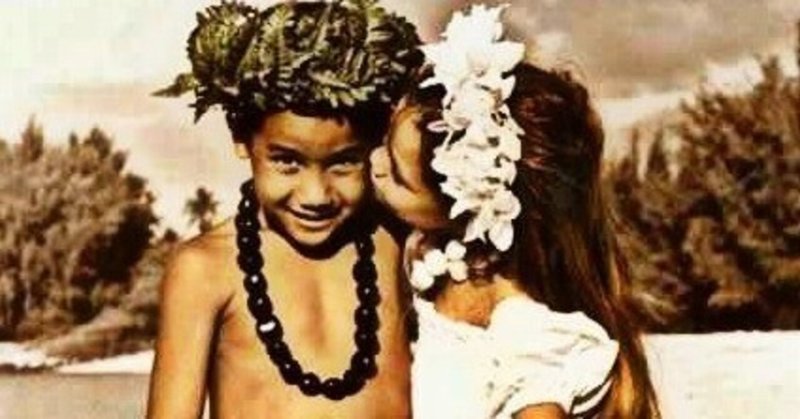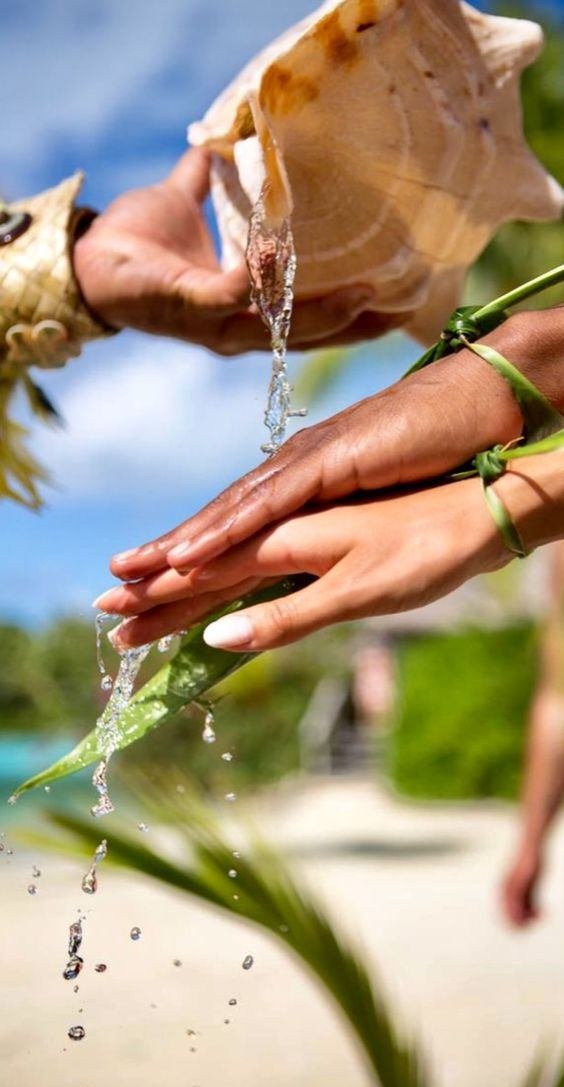
殆どの人が知らない日本の性
先進国ではなかった性の捉え方
現在の観光地化する前のタヒチ諸島は先進国だったという話を長老から聞いた話しを書きます。
一日本人から思うと性は隠すものとタブー視されがちですが、タヒチでは、子供から老人に至るまで日常生活の大部分がセックスに関するものであるとさえ言われています。
タヒチの少年、少女にとってセックスとは「元気?」「元気だよ」という挨拶を交わすぐらいの同じ意味しかもっていません。男女とも12歳~13歳になる頃、母親は、娘に自らの体験や恋愛を交えながら、性交の仕方、熱帯
植物から作った避妊用具の使用法、事後の処置などを詳しく教えています。思春期の息子には父親によって同様の性教育が行われています。また男女の性役割の区別が非常に少ない文化を持つ島でした。18世紀半ばに初めて訪れ
た西欧の探検家たちは、タヒチの女性は著しく高い地位を持っていて、殆どすべての男の仕事を行うことが許されていると記しています。
画家のポール・ゴーギャン、ゴーガン(フランス語読み)も、タヒチの男を
「両性具有的」として描写し、そして「女も男性的なものを持ち、男も女性的なものを持っている」と付け加えています。タヒチでは型にはまった男性性の行動を表す区別や標識はまったく見当らないといわれます。仕事を含め
全般に至るものは家族同士が魚を獲ったり、二つの主要作物であるバニラとタロイモを収穫する時に、互いに協力するように、経済は、男たちに競争心を煽り立てるよりも寧ろ、異常なほどの協力的態度を養成したのです。
男女の性役割の労働の役割に区別がないと当時の欧米人、アジア圏の感覚では際立った特徴をもつタヒチ島の文化にも「マフ」と「レレ」というトランス・ジェンダーが存在しています。「マフ」は女性として育てられた男性
で、「レレ」は 女装する人です。2016年ボクはファファフィネ(Fa'afafine)という儀式で夫/TAO(当時23歳)と結婚しました。初めて心から愛され愛した人です。

この地球上には、同性婚を懐疑的に捉える国が殆どで、日本もその部類に入ります。ボクの場合は、最悪なケースで死別になりましたが彼は多くの言葉を残し今でも傍にいると感じています。長老は、外国人によって性病、結核
天然痘、はしか等さまざまな病気を持ち込み、また、武器を持ち込んで内戦を呼び起こしました。1865年には、島の原住民はわずか7169人になってしまったそうです。タヒチを植民地した後は、祭壇を破壊し、住民にキリスト教
への改宗を強要しました。島の女たちはマザー・ハバードと呼ばれる全身が隠れるドレスを着せられ、伝統的な聖なる儀式やダンスもその後200年にわたって禁止されました。こうして、個人の所有という概念を持たず、余分な
ものを分け与えることを美徳とするタヒチアンの文化は破壊されていったのだと悲しい目で言われました。独自の国の文化を都合よく変えさせるといったのもは、何と野蛮で卑劣極まりないではないかと思います。タヒチ諸島に
限って1843年11月フランスが、タヒチの領有を宣言し独立自主権を失う。1847年ポリネシア(ソサイテエー諸島、マルケサス諸島、ツモアル諸島等)フランスの保護領土として承認される。1880年8月29日タヒチ国王ポマレ5世
によって主権譲渡を宣言、フランスの庶民地になっています。
政治的な歴史は、割愛しますが、フランスは、自国の領土に編入して以降、代償が美しい珊瑚礁を破壊しタヒチの人々のプライドを奪ったのは事実なの
です。悲しい歴史の側面がありますがタヒチの人々は常に明るく、前向きで素晴らしいタヒチの文化を今でも受け継いでいます。新しいものを取り入れ共存することはタヒチ人が最もワクワクするのだと長老は付け加えて言います。

我々現代人の忘れている自由で柔軟な思考と優しさを考えさせられました。是非、タヒチに来てください。きっと人々の優しさと壮大な自然に触れ癒されるものがあなたに愛というものを記憶させるでしょう。
Japanese sex that most people don't know
about away of understanding sexuality that was
not found in developed countries
I heard from an elder that the Tahiti archipelago was a developed country before it became the tourist destination it is today.
As a Japanese person, sexuality tends to be seen as something to hide and is taboo, but in Tahiti, children it is even said that a large part of daily life, even into old age, revolves around sex for Tahitian boys and girls, sex means nothing more than exchanging greetings such as "How are you?" and "I'm fine." When both boys and girls reach the age of 12 or 13, mothers begin to teach their daughters about their own lives. How to have sexual intercourse, how to use contraceptive devices made from tropical plants, and what to do after the fact, with experiences and romance included.
We teach you in detail. Adolescent sons are given similar sex education by their fathers. It was also an island with a culture where there was very little distinction between gender roles.
Western explorers, who first arrived in the mid-18th century, believed that Tahitian women had a particularly high status. He wrote that he was allowed to do almost all men's work.
Painter Paul Gauguin also describes Tahitian men as "androgynous," adding that "women also have something masculine, and men have something feminine."
It is said that in Tahiti there are no distinctions or markers of stereotypical masculine behavior. The economy encourages competitiveness among men, as families cooperate with each other in everything, including work, when fishing and harvesting the two major crops, vanilla and taro. In fact, he developed an unusually cooperative attitude.
In the culture of Tahiti, where there was no distinction between the gender roles of men and women and the labor roles that Westerners and Asians at the time perceived as distinctive, there were also transgender people called MAHU and LELE.
Muff is a man who was raised as a woman, and LELE is a cross-dresser.
In 2016, I married my Boy friend's husband Tao (23 years old at the time) in a ceremony called Fa'afafine. He is the first person I truly loved and loved.
Most countries on this planet are skeptical of same-sex marriage, and Japan also falls into that category.
In my case, the worst case scenario was death, but he left behind many words and I feel that he is still by my side. Elders were exposed to various diseases such as venereal diseases, tuberculosis, smallpox, and measles by Westerners.
They also brought weapons and provoked a civil war. In 1865, there were only 7,169 natives on the island. After colonizing Tahiti, they destroyed the altars and forced the people to convert to Christianity. The women on the island wear a mask called Mother Hubbard.
Traditional ceremonies and dances were prohibited for the next 200 years. It was said with sad eyes that in this way, the Tahitian culture, which had no concept of individual ownership and made the virtue of sharing surplus goods, was destroyed.
How barbaric and despicable it is to force a country to change its own culture to suit its own needs.
think. As far as the Tahiti Islands are concerned, in November 1843, France declared Tahiti its territory and lost its independence and autonomy. 1847 Polynesia (SOCIETE Islands, Marquesas Islands, TUMOAL Islands, etc.),
Recognized as a protected territory of France. On August 29, 1880, King POMARE /V of Tahiti declared the transfer of sovereignty and the island became a common territory of France.
I will omit the political history, but since France incorporated it into its own territory, the price was beautiful coral.
It is true that they destroyed the reef and stole the pride of the Tahitian people. Although there are sad aspects of history, the Tahitian people have always been cheerful, positive and continue to inherit the wonderful Tahitian culture. Tahitians are most excited about trying new things.
The elder adds: It made me think about the free, flexible thinking and kindness that we modern people have forgotten. Please come to Tahiti. I'm sure the kindness of the people and the soothing experience of the magnificent nature will make you remember love for you.
Translation by /Ippei Tachibana
